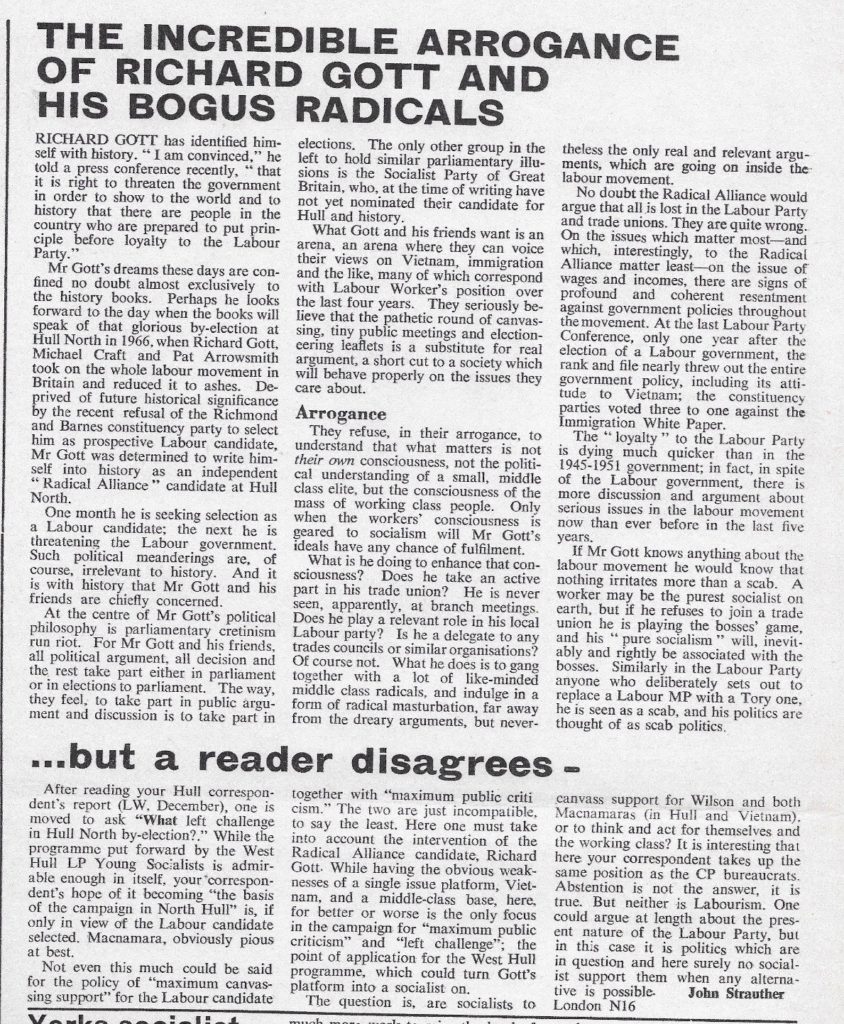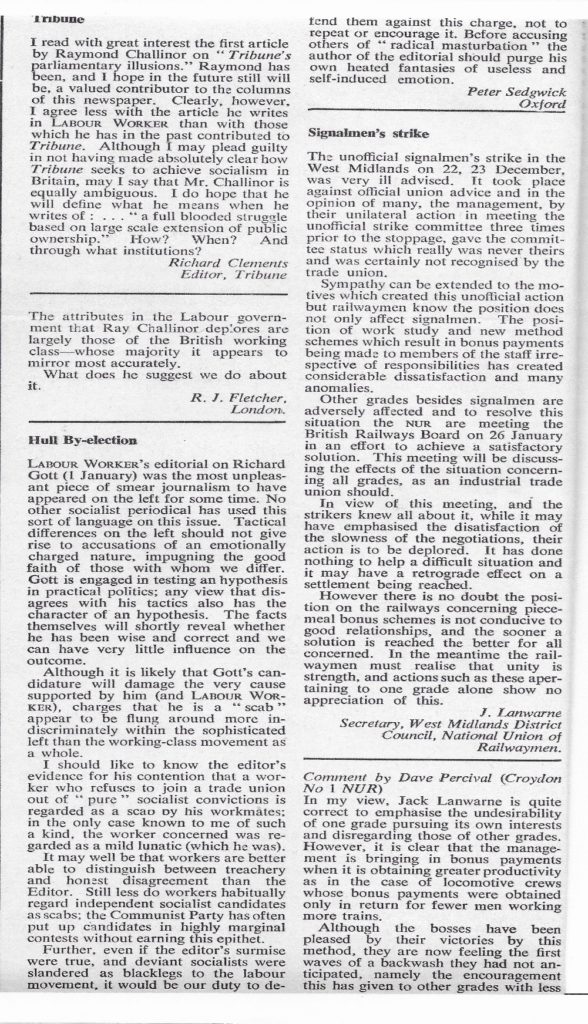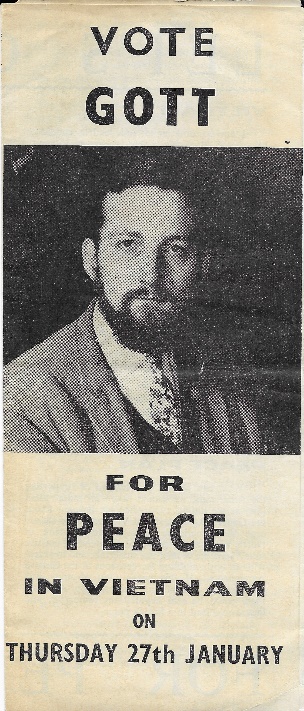Many on the left today will be well acquainted with the fact that the Socialist Workers Party (SWP) and its predecessor organisations, the Socialist Review Group (SRG) and the International Socialists (IS), have consistently called for a vote for the Labour Party at UK Parliamentary elections. To give an example of how wedded to the need to vote Labour the organisation has been, the experience of the Hull North by-election in January 1966 is instructive.
The Hull North seat had been won by Labour from the Conservatives at the 1964 General Election by 1181 votes and the Labour Party had achieved an overall majority of four seats in that election. The by-election was caused by the sudden death of the sitting Labour MP Henry Solomons. Selected to stand for the Labour Party in the by-election was Kevin McNamara. He was a lecturer at a local college and was a candidate not particularly associated with the left.
Richard Gott, himself a Labour Party member and active in the Campaign for Nuclear Disarmament (CND), was put forward for the by-election as an independent “Radical Alliance” candidate in opposition to the Labour Party. The “Radical Alliance” was a loosely organised group that emanated from the radical wing of CND that included, as well as Gott himself, such people as Pat Arrowsmith. Tariq Ali was also involved. Gott campaigned on an anti-Vietnam War ticket as well as on other views, many of which corresponded with the IS’s own positions over the previous years.
Gott’s election leaflet expounded his three-pronged platform as follows:
“War
Rejection of any military or diplomatic strategy based on the use or threatened use of nuclear weapons or other weapons of mass indiscriminate destruction.
Poverty
Massive diversion of expenditure from military budgets to the social services thereby ensuring that all members of our community, both old and new, may be decently housed, employed, educated, and cared for.
Measures to ensure the equitable distribution of the world’s resources among the peoples of the world and a substantial increase in economic and technical aid to developing countries.
Race
Unhindered movement of all migrants between countries. Legislation to prohibit discrimination in all forms. Appropriate international action to bring about the downfall of the white supremacist bastions in Southern Africa.”
The Labour government under the premiership of Harold Wilson that had been elected in October 1964 had, by January 1966, only a tiny majority of one. The Wilson government had already proved to be a disappointment. When Paul Foot wrote about the period in 1968 he particularly pointed to five examples:
“First was the Government’s immediate and unequivocal support for the Americans in their war in Vietnam, particularly their support for the American bombing of North Vietnam, which started in February. Second was the Immigration White Paper in August. Third was the series of nibbling deflations, culminating in the big £100m bite at the end of July. Fourth was the Government’s decision, in the light of the abstention of Desmond Donnelly and Woodrow Wyatt in the House of Commons, to shelve the nationalisation of steel. And fifth, perhaps worst of all, was the National Plan, published in September. All these, in one form or another, were attacked by the Labour Left, though none of these attacks took the form of Parliamentary votes or abstentions. The National Plan particularly irritated those who had hoped for a genuine economic programme based on social justice, welfare, and equality.” 1
On the face of it one might think that the circumstances were right for a radical challenge to Labour – but not so.
The IS newspaper Labour Worker number 49 (1 January 1966) in an unsigned editorial castigated Gott and his supporters as “scabs” and of “indulging in a form of radical masturbation”. The author of the piece has not been definitively identified although the editor at the time was Paul Foot.

Labour Worker No. 49, 1 January 1966
That official line, and particularly the way that the line was delivered, did not meet with anything like universal approval within the organisation. In the next issue of Labour Worker there was a letter from IS member Peter Sedgwick in turn castigating Labour Worker. Sedgwick wrote:
“Labour Worker’s editorial on Richard Gott was the most unpleasant piece of smear journalism to have appeared on the left for some time. No other socialist periodical has used this sort of language on this issue … Before accusing others of ‘radical masturbation’ the author of the editorial should purge his own heated fantasies of useless and self-induced emotion.”

Labour Worker No. 50, 15 January 1966
Sedgwick was certainly not alone. It was reported to the IS “Working Committee” of 8 January 1966 that Alasdair MacIntyre, an IS member at the time and later to become a world famous philosopher, “does not want any more Labour Worker; disapproves of the style of the Richard Gott article.”
In fairness, it needs to be said that IS was not the only organisation to the left of Labour that did not support the Gott campaign. Indeed, supporters of the Gott candidature from the organised left were few and far between either in Hull itself or nationally. Most were terrified of Labour losing its wafer-thin Parliamentary majority. Ian Birchall (1968) in responding to Paul Foot’s 1968 article puts a thoughtful perspective on the issue:
“In Paul Foot’s otherwise excellent article on ‘Harold Wilson and the Labour Left‘ (IS 33), there is one questionable passage. Among Tribune’s sins is listed the fact that it ‘severely rebuked’ Richard Gott for his independent ‘anti-Vietnam’ candidature in 1966. In fact, Labour Worker, the then fortnightly organ of International Socialism, criticised Gott in rather more unkind terms than Tribune.
I raise this point, not out of historical pedantry, but because I think it is important to understand that we were right to take such a stand at that time. Gott’s action did not provide the basis for a real campaign against the Vietnam war, which has developed in a much more healthy non-Parliamentary fashion since, and it did isolate the anti-imperialist movement from the mass of the workers and trade unionists who might otherwise have been more sympathetic to it.” 2
In the event Labour won the by-election quite comfortably. Gott received a derisory 253 votes (0.54 percent) against 24,479 for Labour’s Kevin McNamara (52.22 percent). Interestingly, Gott is sometimes credited with being the reason that the Humber Bridge was built. The demand for the bridge had been something he supported, and the Labour government felt it prudent to “spike his guns” – something they possibly later regretted. John Palmer tells me (pers. comms.):
“I remember, years later, being told by someone in the Wilson government that they cursed Gott for saddling them with a big costly infrastructure project when his candidacy in the Hull North by-election was not the threat that they initially had thought it was!”
It is also highly likely (although Harold Wilson denied it in his memoir The Labour Government, 1964-70: A Personal Record) that their favourable result in the by-election was influential in the decision by Labour to call a General Election in March 1966. Labour Worker No. 54 (14 March) urged “socialists everywhere to vote and work for the biggest possible Labour majority.” Labour duly won the election with a massive 98-seat majority.
That 1966-1970 Labour Government which, of course, spanned the period of struggle centred on 1968 was another massive disappointment for the left. John Palmer says (pers. comms.):
“… it was primarily the global revulsion against the US slaughter in Vietnam which generated – inside and outside the Labour Party – a revulsion among a new generation of young militants. After the 1966 Wilson endorsement of the US cause the disillusion with Labour turned into a virtual tidal wave of recruits to the revolutionary left: overwhelmingly to the (by then) IS.”
The upshot for the IS attitude towards the Labour Party at election time Ian Birchall tells me (pers. comms.) was that:
“I think if you had talked to almost anyone in the IS between May 1968 and the end of 1969 they would have taken it for granted that we would not be voting Labour [at the next General Election]; there were various proposals for abstention and independent candidates. Cliff (who I suspect always realised we would end up having to vote Labour) scrupulously avoided forcing a confrontation with a membership that was largely new and ultra‑left.”
However, when the time came in 1970 and faced with a real decision things changed. Ian continues:
“It was only in the period immediately before the 1970 election that we reoriented back to calling for a Labour vote. There was a heated debate at the Easter 1970 Conference – with Sedgwick and others, calling for abstention, but the IS Executive ‘Vote Labour’ line was carried.”
That line has remained relatively constant since.

Note
This paper is a specially edited extract from my confidential research document:
Rudge, John. 2019. Out for the Count: The SWP and UK Parliamentary Elections, 71pp.
References
- Foot, Paul. 1968. Harold Wilson and the Labour Left. International Socialism (1st series), No. 33, Summer 1968, pp. 18–26. ↩︎
- Birchall, Ian. 1968. From “Letters from Our Readers”, International Socialism (1st series), No. 34, Autumn 1968, p. 28. ↩︎
Were you or someone you know a member of the International Socialists or Socialist Review Group? If so we would like to interview you for our project. Please contact us at contact@is-history.net.

I had only just joined IS, and I can remember heated, but good natured debates on the Vote Labour line of the leadership- genererally disregarded by most of us.